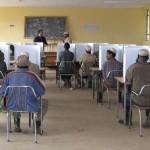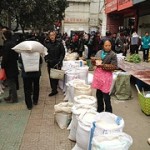Access to markets is challenging for smallholders who may not be able to compete with larger operations that can provide firms with consistent quantities of high-quality products. This barrier to entry may be due to the smallholders’ limitations to exploit economies of scale, but it can also be due to their apprehension to sign contracts. IFPRI’s research project, Contracting Out Poverty: Experimental Approaches to Innovation in Agricultural Markets with Small Farmers, explored three innovative contract structures to solve this problem, focusing on markets for high-value crops in three diverse locations: Peru, Tanzania, and Viet Nam. Using randomized trials, innovative contract designs were developed with private companies in each country (a mango producer in Peru and milk processors in Viet Nam and Tanzania).
Reviewing the Reform Experience
Working with leading experts on the reform era who are well informed about the internal processes and logic that drove the reform movement, IFPRI explored China’s economic growth.
Industrialization in China and Africa
The business model called “clustering” involves small businesses that are part of the same industry banding together to specialize in one narrowly defined stage of production. An IFPRI research team completed a study involving four in-depth case studies in China on the subject.
Public Investment in Agriculture in China
IFPRI’s Priorities for Pro-Poor Public Investment in Agriculture program, active from 1998 to 2002, provided policymakers with the research-based evidence they needed to determine which investments to make and how to maximize their efficiency in reducing poverty and food insecurity.
The Systemwide Program on Collective Action and Property Rights
The main goal of the CGIAR’s Systemwide Program on Collective Action and Property Rights (CAPRi) is to reduce poverty by identifying effective policies and practices to enhance the use collective action and property rights in order to build secure assets and income streams for and by poor people.
Sustainable Food Security for all by 2020
The conference, focused on four key emerging dynamics: demographic, health, and nutrition forces; economic forces; technological and environmental forces; and sociopolitical forces.
- 1
- 2
- 3
- …
- 9
- Next Page »



